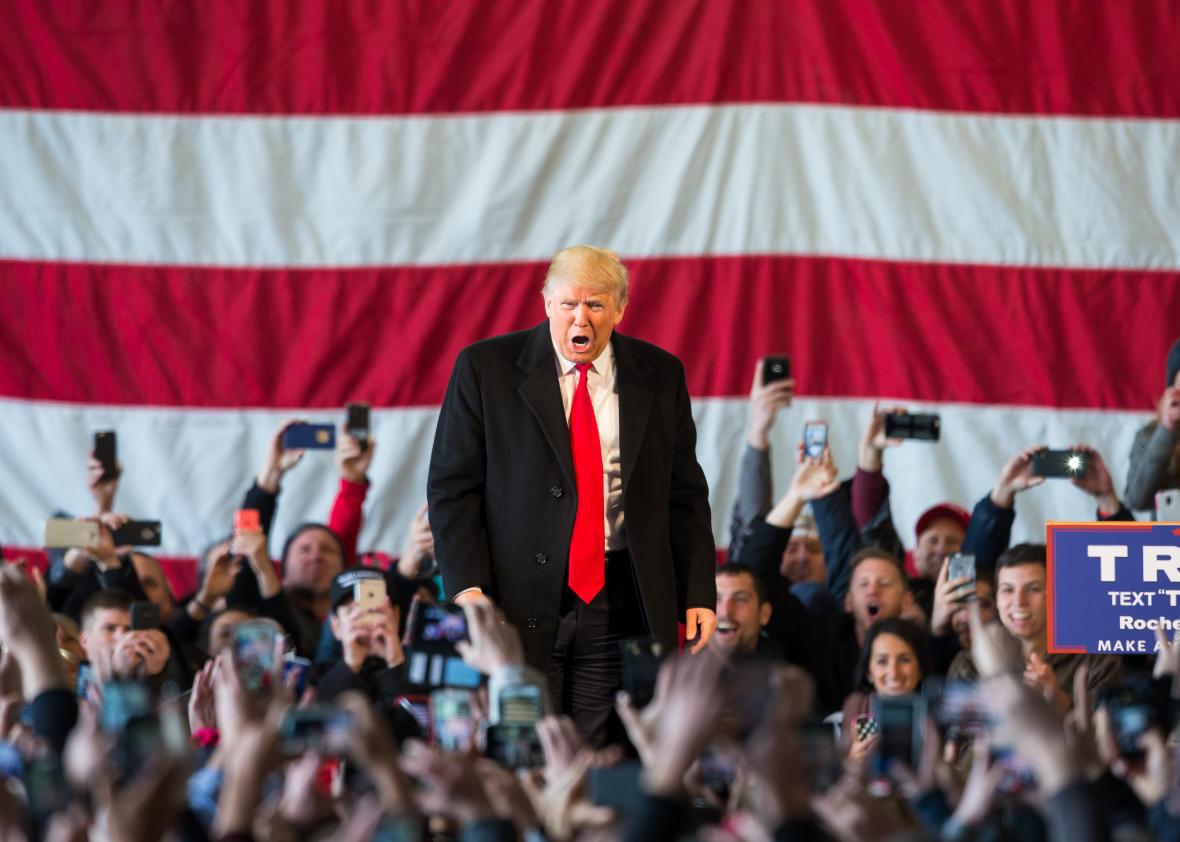Donald Trump’s run for the presidency has gotten special attention because Trump has waged a strange, unstructured, and unorthodox campaign that has often ignored Republican litmus tests. This, combined with Trump’s economic protectionism and aversion to nation building, have led some reporters and commentators to argue that Trump is actually, on certain issues, running to Hillary Clinton’s left in a way that could scramble the electoral map. An example of this comes via the Washington Post, which had a big news story on Tuesday titled, yes, “How Donald Trump is Running to the Left of Hillary Clinton.” The problem is that he isn’t running to her left, and the idea that he is comes from Trump’s own narrative, which some in the media are all too willing to parrot.
The Washington Post story begins not with Trump’s positions but with his cynical, calculated appeal to Bernie Sanders voters. (Trump has lately been calling for Sanders to run as a third-party candidate, which of course would be great for Trump.) In this instance, he aped Sanders’ words by claiming that Hillary Clinton “is totally controlled by Wall Street.” The Post writer, Jose A. DelReal, adds:
That’s not the only area where the presumptive Republican nominee sounds like Sanders, who is challenging Clinton for the Democratic nomination. On a series of issues, including free trade and foreign military intervention, Trump is effectively running to the left not only of his own party but also of Clinton.
The language here is a little loose, but what point is DelReal trying to make? Trump’s claim that Clinton is controlled by Wall Street is not an “issue,” nor is Trump putting forth any proposal that would make him tougher on Wall Street than Clinton is. (Clinton is in favor of Dodd-Frank, for example; Trump, to the right of her, wants to repeal it.) And yet Trump gets credit for “running” to Clinton’s left because of a line in his speeches that has no bearing on anything.
DelReal then moves to NAFTA, where Trump has in fact taken a position typically defined as left-wing. But DelReal’s categories become confused. He writes:
The real estate mogul has sought to develop a clear contrast with Clinton on foreign affairs and international trade, calling for an “America First” policy that simultaneously turns her experience as the nation’s chief diplomat against her while tapping into the anxieties of angry voters worried about being left behind by globalization. In recent days, he has also moved to the left on the minimum wage and tax policy, suggesting that he is willing to alter his positions to benefit the middle class.
For starters, an America First policy is not a “left” one. It is, again, not even a policy. As for his minimum wage and tax ideas, not only are there no specifics behind Trump’s supposed willingness to moderate his prior positions, but what he would be moderating them from is their current position on the far right of the spectrum. Trump’s giant, regressive tax cut is extreme even for Republicans, and he’s been opposed to raising the minimum wage. About the latter, he told Fox News on Monday: “I am looking at it. I haven’t decided in terms of numbers. But I think people have to get more.” What these occasional rhetorical feints are doing in a piece about moving to the left of Clinton is beyond me. (Earlier in the primaries, Trump claimed that wages were “too high.”)
The piece gets even more muddled when it turns to foreign policy. DelReal writes: “Sanders and Trump have both blasted Clinton for her 2003 vote in favor of the Iraq War … Both also now criticize her for the 2011 military intervention in Libya, although Trump was a strong supporter of it at the time.” So Trump is blasting Clinton for supporting two wars that he also supported. Trump’s decision to attack Clinton over them has nothing to do with ideological differences.
In sum, Trump is running to the left of Clinton because he opposes trade deals like NAFTA and … well that’s about it. (I will leave it up to others to decide whether blaming foreigners for stealing American jobs and ruining America is in fact a left-wing position.) On every other issue mentioned by DelReal, Trump is either well to the right of Clinton (Wall Street, the minimum wage, taxes) or held an identical position to hers but is now critical of her leadership.
Stories like this are a sign of several things. The first, rather obvious one is that candidates’ platforms are often ignored at the expense of their latest rhetoric. And the second is that Trump has been unusually effective at making himself seem to be more ideologically fluid than he in fact is. It’s true that Trump broke often with Republican orthodoxy, especially rhetorically. (Just think back to his avowed refusal to let people die on the street because of a lack of health care.) And perhaps because most of his answers to policy questions contain no substance, it’s tempting to assume he won’t be as awful as we fear—that’s at least what guys like Bill O’Reilly are telling you. But he is not running to Hillary Clinton’s left, and to claim that he is only does Trump’s work for him. Trump wants us to believe this election is ideologically complicated and muddy. It’s not.
Read more Slate coverage of the 2016 campaign.
